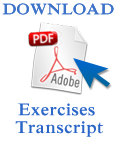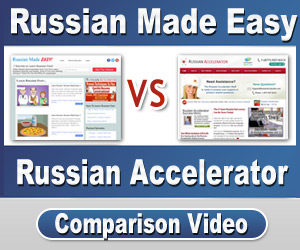Playing the Role of Interpreter
Listen To Entire Episode
Exercises Only
Welcome to episode #10. Today we’re going to have you play the role of interpreter. Aside from being fun practice, this is also pretty realistic. After all, you’re probably the only person in your group or your family who speaks Russian, now. So, they’ll need you to interpret for them if they go with you to Russia or Ukraine, or if a Russian speaking friend or relative comes to visit. So, get ready to translate…
I need to mention, as I’ve done from time to time, that these podcasts are cumulative. Each one assumes you’ve mastered the material taught in all the previous episodes. So, if you’re new, please start with Episode #1 of RussianMadeEasy. Ok, let’s dive in. Please translate the following:
Здравствуйте. Меня зовут Владимир.
Means: Hello. My name is Vladimir.
А как Вас зовут?
And what’s your name?
Это мой друг Сергей. Он – музыкант.
This is my friend Sergei. He is a musician.
А это моя подруга Наташа. Она – студентка.
This is my friend Natasha. She is a student.
Джон – американец. A Катя – англичанка.
John is an American, whereas Katya is an Englishwoman.
Марк, это твой папа?
Mark, is this your dad?
Да. Он – адвокат.
Yes. He’s a lawyer.
And this is your mom?
А это твоя мама?
Yes. She is a doctor.
Да. Она – доктор.
Мой папа – австралиец, а моя мама – американка.
My dad is an Australian, whereas my mom is an American.
Сергей, хочешьь кушать?
Sergei, want to eat?
А что есть?
And what is there?
Есть паста и салат и суп.
There is pasta and salad and soup.
Хорошо. Я буду пасту, пожалуйста.
Ok. I’ll have pasta, please.
А что ты хочешь, Наташа?
And what do you want, Natasha?
А я хочу борщ.
And I want borscht.
In this next one, there’s a word that’s new to these podcasts. The word is ИЛИ. Can you figure out what it means?
Хочешь чай или кофе?
Хмм..Чай, пожалуйста.
So, или translates as “or”. Let’s try those last two phrases again…
Хочешь чай или кофе?
Want tea or coffee?
Хмм..Чай, пожалуйста.
Hmm…Tea, please.
Imagine you’re standing outside a pizzeria and a sushi bar. Your friend asks:
Что ты хочешь? Пиццу или суши?
That means: What do you want? Pizza or sushi?
Я не хочу кушать.
I don’t want to eat.
V.O. And now, here’s your Tip of the Day from Russian Made Easy…
To really maximize your practice time, I recommend hitting pause now and again, and treating the phrase you heard as a construction. Then quickly input a few different content words. For example, that last phrase was:
Я не хочу кушать.
The content word there is кушать…that’s the word you can take out to insert other words. So you might say:
I don’t want pizza.
Я не хочу пиццу.
I don’t want vodka.
Я не хочу водку.
I don’t want sushi.
Я не хочу суши
Just a few, like that. See if you can rattle off five really quickly. That’s just a good habit to get into when you’re listening to a lot of Russian. Hit pause after a particular phrase and treat it as a construction.
Let’s keep going. Translate the following…
Марк, кто это?
Mark, who is this?
Это мой друг Глэн. Он – бизнесмен.
This is my friend, Glenn. He is a businessman.
Он – канадец.
He’s a Canadian.
А кто это?
And who’s this?
Это моя подруга Джэнифер. Она – австралийка.
This is my friend Jennifer. She’s Australian.
Хочешь йогурт или маффин или блины?
Want yogurt or a muffin or crepes?
Нет, спасибо. Я не хочу кушать.
No, thanks. I don’t want to eat.
Хочешь капучино?
Want cappuccino?
Хорошо. Спасибо.
Ok. Thanks.
Икру?
Caviar?
Хмм…икру? Нет, спасибо. Не хочу.
Hmm…caviar? No thanks. I don’t want.
So, how’d you do with all these? If you got most or all, then you’re doing great. This episode was kind of a mid-term, so we’re getting out of class early today. But today’s exercises are longer. What I did for the download exercises was take today’s translation practice and flip it around. So, for homework, you need to say each of today’s phrases in Russian. So be sure to download those, and I’ll see you in the next episode.
DOWNLOADS – (right click with mouse and “save as”)


Please comment or share with one of the buttons below. Your support helps keep the ball rolling!





Leave a Reply